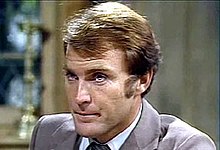Scott Fredericks
Scott Fredericks | |
|---|---|
 Scott Fredericks as Maximillian Stael in "Image of the Fendahl" (1977) | |
| Born | Frederick Wehrly 15 March 1943 |
| Died | 6 November 2017 (aged 74) Sligo University Hospital, The Mall, Rathquarter, Sligo, County Sligo, Ireland |
| Occupation | Actor |
| Children | 2 |
Scott Fredericks (born Frederick Wehrly; 15 March 1943[1] – 6 November 2017[2][3]) was an Irish actor best known for his roles on British television.
Early life
[edit]Fredericks was born in Strandhill, County Sligo to Edward Wehrly (d. 2001), a jewellery businessman (Wehrly Bros Limited) of German descent, and Ann (née Shaw).[4][5][6]
He left Sligo when he won a scholarship to train at RADA in London, and later adopted the name Scott Fredericks.[1]
Career
[edit]Scott Fredericks began his acting career with stage roles at the Chesterfield Repertory. He later worked with director Peter Brook and appeared in West End theatre productions of Antony and Cleopatra (as Mark Antony) and in Becket (as Henry II of England).[1]
After appearing in the television soap opera Crossroads, Scott Fredericks went on to appear in a number of British television programmes in the 1960s, 70s and 1980s, including Z-Cars, Sutherland's Law, Dixon of Dock Green, Blake's 7 (episode "Weapon"[7]), and Triangle. He made two appearances in the Doctor Who, in the serials Day of the Daleks (as Boaz) and Image of the Fendahl (as Max Stael).[1][8] He also appeared in a 1981 episode of the ITV television police drama, Cribb ("The Hand That Rocks the Cradle") playing Prince Henry of Battenberg.[9][6]
Fredericks also appeared in such feature films as Dad's Army (1971), See No Evil (1971) and Cal (1984). Whilst working in cinema productions, he once played a game of billiards with Fred Astaire.[6] More recently, he appeared as a regular character in the Irish soap Fair City, as well as spending his time as a radio producer and director in his native Ireland.[1]
Fredericks's stage career included leading roles in the Gate Theatre, Dublin, a long run of Peg o’ My Heart by J. Hartley Manners, and in stage adaptations of Cal and Caught in a Free State with the newly created Irish Theatre Company. For his solo stage show Yeats Remembers Fredericks was awarded the J.J. Finnegan Evening Herald Award in 1980.[1]
Filmography
[edit]| Year | Title | Role | Notes |
|---|---|---|---|
| 1970 | The Rise and Rise of Michael Rimmer | TV Crewman on TV | Uncredited |
| 1971 | Dad's Army | Nazi Photographer | |
| 1971 | See No Evil | Steve's Man | |
| 1974 | From Beyond the Grave | Man at Seance | (segment 1 "The Gate Crasher"), Uncredited |
| 1976 | The Deadly Females | Mark | |
| 1984 | Cal | Soldier at Farm |
Death
[edit]Fredericks suffered from smoking-related illnesses and toward the end of his life had undergone a lung lobectomy and suffered from an aneurysm.[6] Fredericks died in 2017 at Sligo University Hospital in Ireland. His funeral was held at Cathedral of the Immaculate Conception, Sligo and he was buried in Sligo Cemetery. Fredericks was survived by his two sons.[2]
References
[edit]- ^ a b c d e f "Scott Fredericks". irishequity.ie. Irish Equity. Archived from the original on 12 November 2017. Retrieved 14 December 2022.
- ^ a b Obituary: "SCOTT, Fredericks: Death". irishtimes.com. Irish Times. Archived from the original on 14 December 2022. Retrieved 14 December 2022.
- ^ "Obituary: Irish actor and broadcaster Scott Fredericks". Archived from the original on 14 December 2017. Retrieved 14 December 2017.
- ^ "WEHRLY, Ann : Death notice - Irish Times Family Notices". notices.irishtimes.com.
- ^ "Well-known Sligo businessman dies". Independent.ie. Retrieved 14 November 2017.
- ^ a b c d "He danced to his own tune". The Sligo Champion. Archived from the original on 26 November 2017. Retrieved 14 December 2022.
- ^ Muir, John Kenneth (15 September 2015). A History and Critical Analysis of Blake's 7, the 1978-1981 British Television Space Adventure. McFarland. p. 82. ISBN 978-1-4766-0493-0. Retrieved 14 December 2022.
- ^ Lentz III, Harris M. (3 May 2018). Obituaries in the Performing Arts, 2017. McFarland. p. 131. ISBN 978-1-4766-3318-3. Retrieved 14 December 2022.
- ^ Telotte, Leigh Ehlers (30 June 2020). Victoria, Queen of the Screen: From Silent Cinema to New Media. McFarland. p. 113. ISBN 978-1-4766-7904-4.
External links
[edit]- Scott Fredericks at IMDb
- Scott Fredericks on Tardis Wiki, the Doctor Who Wiki
